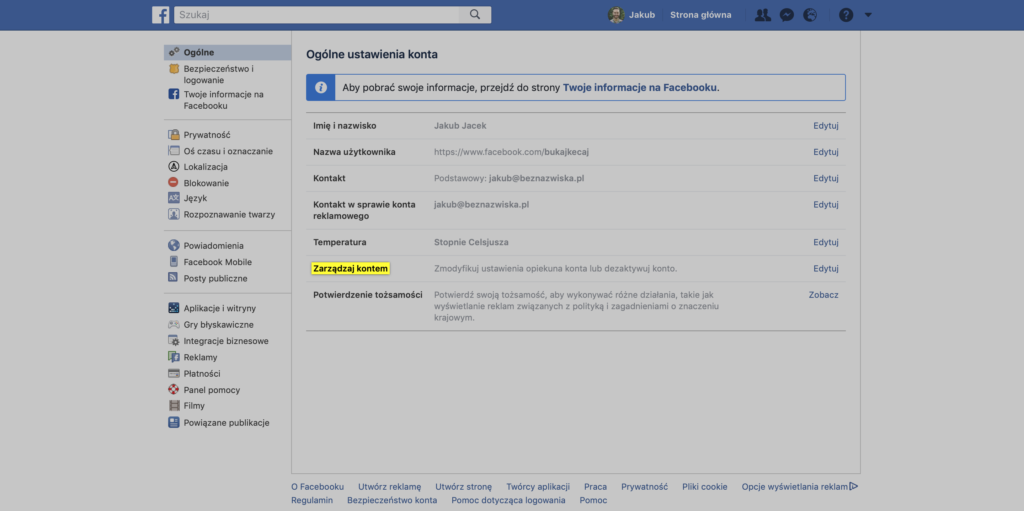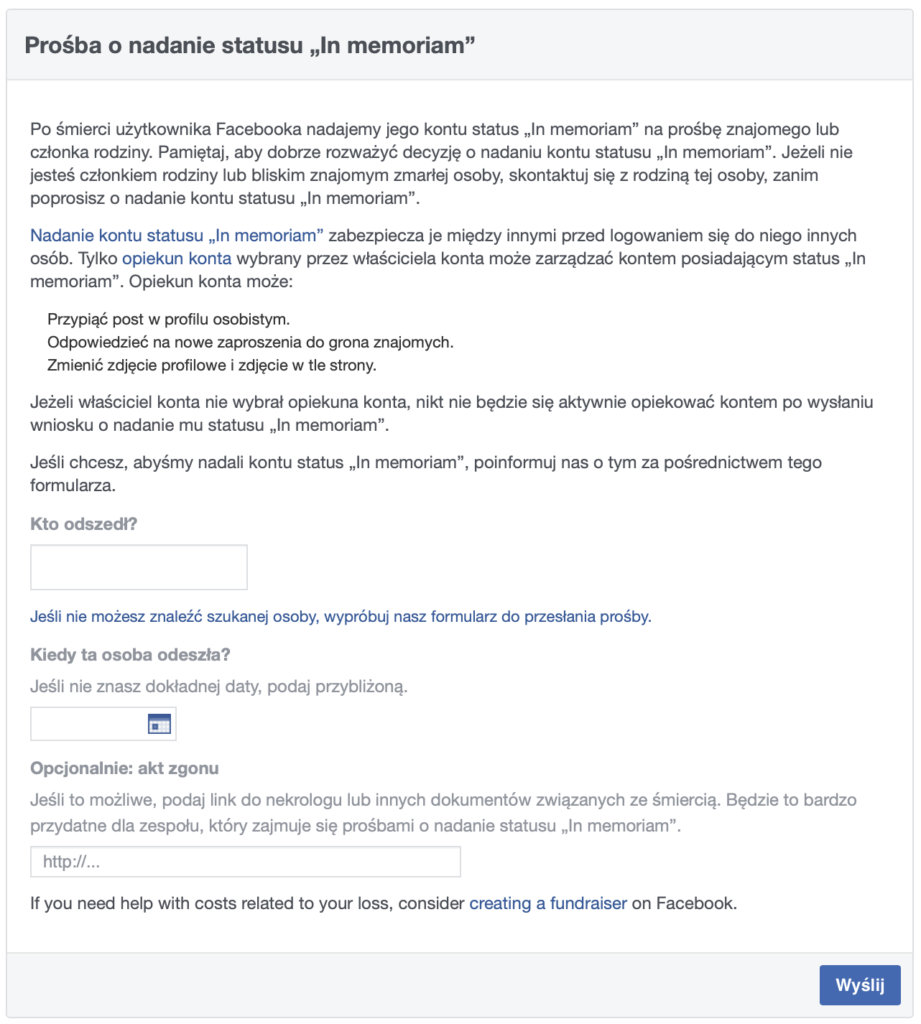Nowadays, we all spend a large portion of our lives on Facebook, but have you ever wondered what will happen should you die? Since we leave a large part of our life on a media platform, it might be a good idea to think what happens when we die, no matter how weird it might seem.
You may not have encountered this problem yet, but in my opinion, we are literally a few seconds from the moment it starts to bother us. For two reasons.
First of all, the generation of people who were born with a smartphone in their hand already have accounts on Facebook.
Photos of these children landed on the platform before they were yet aware of it. And when they started to be, they continued the work of their parents, giving Facebook a look into virtually every stage of their lives – from babies, through adolescence and adulthood to … old age.
This is the second reason.
People aged over 60 are currently the fastest growing (contrary to appearances, extremely active) group of recipients on Facebook. Whether we like it or not, it means that in the coming years we will face many situations relevant to this entry.
Want to work with us?
The effects will be the same in both cases. Relatively soon, due to the great involvement of the community showing their daily life on Facebook (2.27 billion users per month [Facebook Newsroom]), we will witness more and more accounts of people who died, it has been already happening but hasn’t been quite as obvious due to the smaller number of people.
Since we take care of our last will, including the savings and property in our real life, shouldn’t we also take care of our digital death?
Leaving some kind of a digital “souvenir” behind, even in the form of a place where you can write a few words about the deceased – previously checked in terms of what we want to show – is possible.
Digital death so far
Currently, profiles of deceased people are usually treated as virtual tombstones. And I admit that this isn’t a bad idea. Friends write what they feel on the board of the deceased, upload photos and videos together – this is a normal way of dealing with a situation like that.
If we do it in real life, why not do it in the digital one.
I fully support that.
However, it would not be reasonable to still receive party invitations and page recommendations after we are gone, would it now?
But let’s take a step further because it’s not all about us. No matter what you believe, when you die, technically life ends for you, but your loved ones still have to live with the consequences of your death.
It would undoubtedly be upsetting for your family and friends every time they saw a photo of their loved ones at a Facebook event, a newly formed group, or – even worse – a birthday notification.
We have to also consider the fact that not all friends of the deceased will find out about their death right away, especially if they were not very close (then the algorithm might not show you anything from their page, even the information posted by their family members). And as many friends might be unaware of the situation, there can be dozens of birthday wishes, funny photos and Instagram stories (because Snapchat is not doing well) screenshots posted on the page of the deceased person, which would definitely make their families and loved ones upset and it would put them in an awkward position to read birthday wishes for someone who has died.
Sounds like a scene from a black comedy, doesn’t it?
Unfortunately, the reality started revealing the unpleasant truth more often, although at the same time the users are to blame as well. After all, there are tools to somewhat “program” our digital death.
How to take care of your digital death?
So what can you do to spare your relatives these unpleasant situations in which Facebook will remind them of your joint trip to the sea or suggest adding the deceased to the group of Facebook friends?
First of all, you must remember that Facebook will not share your login details, private messages, or any other sensitive content with anyone (even your family) – no matter which option you choose to deactivate your profile (and whether or not you use any of the options).
However, you can designate a person (from your Facebook friends) who will have basic access to your profile after you mark it as belonging to the deceased person. I recommend setting this up once and then forgetting about that gloomy setting. Don’t worry – Facebook will make sure you still trust your Account Guardian once a year.
You can choose a designated Account Guardian in the general settings.

The person you choose won’t be notified.
If you allow it (by checking the appropriate checkbox), the Account Guardian will be able to download a copy of the materials that you have shared on the portal (including posts that you may have hidden for them), but this copy will not contain any private content (such as private messages). In addition, the person will be entitled to change your profile photo and cover photo, as well as pin the corresponding post on your timeline.
Of course, you don’t have to do it, although choosing an Account Guardian will spare your loved ones the unnecessary pain and will make it easier for them to take any actions related to your Facebook profile.
After your death, your relatives or friends will have two options.
How to set up the In Memoriam profile?
Translated by Facebook as “forever in our memory”, it is the basic and safest form of remembering the deceased on Facebook. A request to change a “live” account to an account with In Memoriam status can be sent by anyone.

To do this, just fill in the appropriate application, which will be verified by the part of a Facebook team dealing with this topic.
After granting an account with In Memoriam status, the materials published by the deceased on his profile will be preserved and will be available to all the recipients with whom they shared it before.
Also, no one (except for the previously established Account Guardian) will be able to make any changes to the In Memoriam profile. Switching the profile to this mode permanently blocks access to the account to prevent accidental logins (e.g. in the case of a dead person’s password saved in the web browser).
You can see an example of an In Memoriam account here or here.
Deleting your profile
It may also be the case that the family doesn’t wish the deceased’s account to remain active. The complete removal of the profile from the portal is the second option that Facebook provides here.
To request the removal of the deceased’s account, just like in the previous case, complete the appropriate application. Before the account is deleted, however, Facebook may ask for documents confirming their death, as well as confirming the kinship of the person making such a request (unless the request is sent by your Account Guardian).
Both switching the deceased person’s profile to In Memoriam mode and complete deactivation of the account will result in excluding the account from public activities, such as notifications from people you may know, ad recommendations, or birthday reminders.
Nevertheless, I recommend that you make it easier for your relatives and appoint an Account Guardian. That will help your loved ones deal with your account after your death and spare the trouble of having to prove it to Facebook that you are actually dead.
Let me know what you think about it all. Is it worth worrying about your digital death while we’re still alive? Would you prefer your account to be deactivated or kept in the form of a digital “In Memoriam” page?





